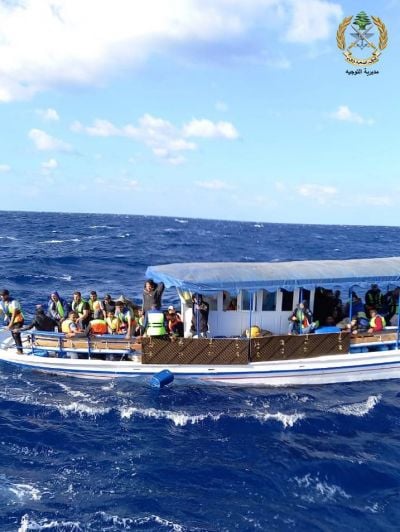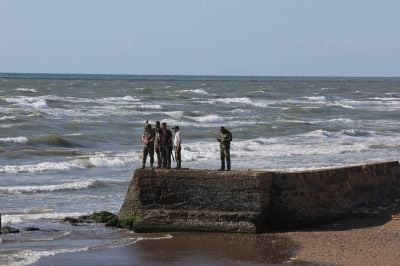A boat of irregular migrants intercepted by the Lebanese Army on December 31, 2022, off Selaata, in North Lebanon. (Credit: Lebanese Army)
The year 2022 ended with yet another major shipwreck. On Dec. 31, the Lebanese army and UNIFIL rescued 232 people whose irregular migration boat had capsized off the coast of Selaata, northern Lebanon.
Two people, a woman, and a child lost their lives in this latest attempt to reach Europe by sea.
“Please specify the identity of the victims. We are worried about our loved ones,” read a tweet on the Lebanese army's official Twitter account on Saturday.
The year 2022 was marked by the exacerbation of the economic crisis and witnessed numerous attempts at irregular migration, some of which ended in tragedy.
In April, a boat carrying 84 people capsized off Qalamoun, near Tripoli, after being intercepted by the Lebanese navy.
The operation quickly turned into a nightmare because the boat was overloaded, according to the army, while many survivors accuse the military of having brutally attempted to stop them.
Only 45 of the people on board could be rescued. Six of them drowned, including an infant. The others are officially classified as missing.
Faced with the anger of the local population, the army finally dispatched a small submarine to locate the sunken boat, but the bodies could not be recovered.
Another shipwreck made news in September, after leaving Lebanon and sinking off the coast of Tartous in Syria.
More than 100 people lost their lives on this journey, making it one of the deadliest migration attempts in the eastern Mediterranean in 2022.
Of the 150 Lebanese, Syrian and Palestinian passengers on board, only 20 were rescued.
 Mourners weep at the funeral of a shipwreck victim on September 24, 2022. The boat departed Lebanon and sunk of the coast of Syria. (Credit: Fathi al-Masri/AFP)
Mourners weep at the funeral of a shipwreck victim on September 24, 2022. The boat departed Lebanon and sunk of the coast of Syria. (Credit: Fathi al-Masri/AFP)
“We thought that irregular migration would decrease after the tragedies in Qalamoun and Tartous,” said Mohammad Sablouh, a lawyer and civil society activist in Tripoli, the capital of the north, which is home to many would-be emigrants due to poverty and unemployment. Sablouh has represented some of the shipwreck victims’ families.
“But, on the contrary, the trend continues to grow,” he added. “This trend could increase in 2023 if the crisis intensifies and if the lira continues to plunge against the dollar.”
Sablouh blamed the security forces for “not doing their job” against smugglers, who take advantage of the migrants’ desire to leave Lebanon in order to extract money and send them on dangerous makeshift boats.
“The only serious prosecutions took place after the Tartous tragedy, which shook the country to its core,” he said. “In principle, the authorities should prosecute the smugglers for human trafficking, a charge considered a crime by the Lebanese justice system,” and not for a more minor reason such as negligence, Sablouh told L’Orient-Le Jour.
Taking to the sea this summer
Most of the Lebanese candidates for migration come from the North of the country and from Akkar, two areas that have long suffered neglect by the authorities.
Zaher Kassar, the mukhtar from the village of Bebnine in Akkar, offers humanitarian support to many families from the area who have already attempted the crossing.
“There are more and more Lebanese who aspire to emigrate illegally, but no one has exact figures on this trend,” he said.
According to him, Lebanese people who board for Europe pay $5,000 to $6,000 per family, thanks to friends or family ties with the smugglers. “Palestinians and Syrians pay $4,000 to $5,000 per person,” Kassar said.
The mukhtar added that he has heard of “many people wanting to go to sea this summer” to try to reach Europe. “I don’t advise anyone to attempt this crossing, but I understand those who do.”
While clandestine migration by means of makeshift boats was initially favored by Palestinian and Syrian refugees, many Lebanese joined in with the country’s economic and social situation deteriorating.
In 2022, 62.2 percent of would-be emigrants were Syrians, 28 percent were Lebanese, and 11 percent were Palestinians, according to figures from the United Nations High Commissioner for Refugees (UNHCR).
From January to December 2022, UNHCR claimed to have received reports of 51 boats involved in irregular movements, with 4,334 passengers on board.
“The number of passengers in 2022 increased by 176 percent compared to the same period in 2021 [1,570 people, including 186 Lebanese],” said Lisa Abou Khaled, spokesperson for the UNHCR. The majority of these boats attempted to reach Cyprus. In 2020, UNHCR became aware of 34 boats, including 13 successful and 21 failed attempts, involving 794 passengers, including 148 Lebanese.
Figures obtained from the Internal Security Forces (ISF) show that the security services arrested 85 people, both smugglers and migrants, between January and September 2022. The Lebanese army was not available to provide figures to L’Orient-Le Jour.
“As for the reasons for leaving Lebanon, from UNHCR’s conversations with people who have been intercepted, rescued or returned to Lebanon, it is clear that these are desperate journeys undertaken by people who see no way of surviving here as the socio-economic situation continues to deteriorate,” said Lisa Abou Khaled.
“Many would-be migrants cite the lack of access to basic services and limited employment opportunities or having relatives in the destination countries,” she added.
Kassar, the Bebnine mukhtar, said that many Lebanese who attempted to cross by sea and failed are now imprisoned in Greece, Turkey or Cyprus and are struggling to go back to the country because of complicated bureaucracy.
“A mother recently asked me to help her repatriate her son who has been detained in Greece for several months,” said Kassar. “We contacted the Greek embassy in Beirut, without success. The procedures are complicated at the General Security level.” He added that he managed to repatriate a young man from Bebnine who was detained in Turkey.
While many migrants fail to make it across the Mediterranean, some do manage to, said Zaher Kassar. “A man from the north told me that his son has arrived safely in Germany and that his wife and seven children will join him soon,” he said.
Kassar does not hesitate to denounce the smugglers “who take advantage of people’s pain to make money.”
For his part, Sablouh, the lawyer, said he is following up on the case of two Lebanese people from Mina, Tripoli, who are being prosecuted in Turkey for their smuggling activities.
This article was originally published in French in L'Orient-Le Jour. Translation by Sahar Ghoussoub.

